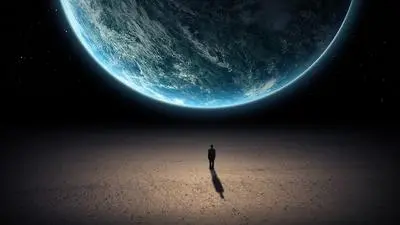Unveiling Reality
Bryan Roberts
About the Course
Does science still need philosophy? In a world of hadron colliders and global telescopes, what can’t science tell us? From the birth of the scientific method to the limits of black holes, philosopher of science Bryan Roberts takes us to the very limits of science and philosophy.
Scientists have achieved things that were simply unimaginable in centuries gone by. With physicists now delving into the intricacies of quantum mechanics and searching for dark energy, philosophy seems to have been left far behind.
In this two-part course, Bryan Roberts argues that scientists need philosophy now more than ever. Drawing on theories at the cutting-edge of physics, he contends that scientists cannot help but think philosophically about the relationship between theory and reality.
By the end of this course, you will have learned:
- How the modern scientific method came about.
- Why the ‘Shut up and calculate’ dictum is troubling.
- Why particle physicists will soon need to rethink the relationship between theory and data in their field.
- What science can’t do.
- How we draw the distinction between human limits and hard limits.
- Why there are some things we’ll never be able to prove.
As part of the course there are in-video quiz questions to consolidate your learning, suggested further readings to stimulate a deeper exploration of the topic, discussion boards to have your say and an end-of-course assessment set by Dr Roberts.
IAI Academy courses are designed to be challenging but accessible to the interested student. No specialist knowledge is required.
About the Instructor
-
Bryan Roberts
Professor of Philosophy of Science at LSE and winner of the Rob Clifton Memorial Book Prize, Bryan Roberts works on the philosophy of physics.
Course Syllabus
-
Part One: Why Science Needs PhilosophyRoberts traces the history of the scientific method and explains why science needs philosophy.
-
Part Two: The Limits of ScienceRoberts draws a distinction between human limits and hard limits before revealing the limits of black holes.
Suggested Further Readings
- Okasha, S., Philosophy of Science: A Very Short Introduction, (Oxford: Oxford University Press, 2002).
- Roberts, B., Philosophico-Scientific Adventures, (London: 2017).
- Chalmers, A. F., What Is This Thing Called Science?, (Maidenhead: Open University Press, 2013).
- Cartwright, N., How the Laws of Physics Lie, (Oxford: Oxford University Press, 1983).
- Kuhn, T. S., The Structure of Scientific Revolutions, (Chicago: University of Chicago Press, 2012 [1962]).
- Ladyman, J. and Ross, D., Every Thing Must Go: Metaphysics Naturalized, (Oxford: Oxford University Press, 2007).
- Hacking, I., Representing and Intervening: Introductory Topics in the Philosophy of Natural Science, (Cambridge: Cambridge University Press, 1983).


